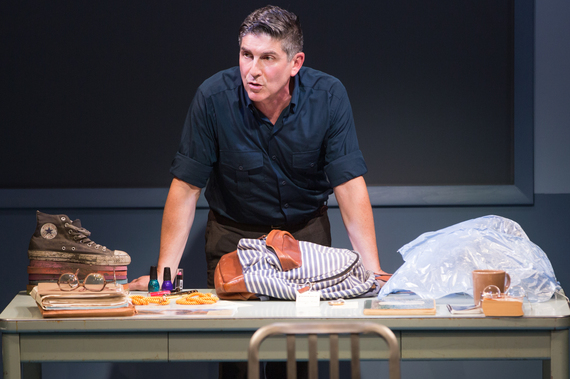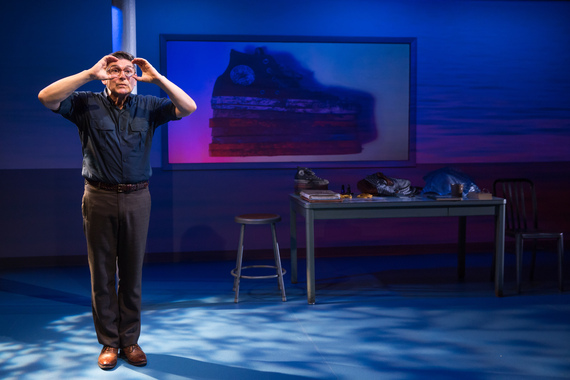Photo Credit: Matthew Murphy
"The purpose of art is to address the questions of our time. If I'm not doing that, I'm not fully engaged," James Lecesne said.
His sensitivity and thoughtfulness contrasted my first impression of him from a few days before, when he primarily portrayed a gruff detective from the Jersey Shore in his one-man show at the Westside Theatre. But if Chuck DeSantis was a lovable tough guy with a Jersey affectation, the true Lecesne proved his opposite -- contemplative and optimistic with the brilliance of a star 10 parsecs from our planet.
His new American drama, The Absolute Brightness of Leonard Pelkey, is an allusion to that same kind of ebullient energy. Lecesne represents nine distinct characters, but never Leonard himself, who appears only in a photograph. The story has the potency to break your heart and make you laugh at the same time; Lecesne mobilizes a collection of archetypal personalities to uncover the narrative of a complex 14-year-old boy.
"There's usually some amount of love that I have for these characters," Lecesne said. "In a funny way, they choose me."
He has a knack for taking ordinary people and revealing their intricacies. In Absolute Brightness, a loud hairdresser, an embarrassed teenager, a regretful clockmaker, and an outgoing theater teacher are among the many cloaks he wears. Their quirks are all too familiar, but their depth -- that seems shocking to a population that often judges based on surface impressions.
Photo Credit: Matthew Murphy
Some of Absolute Brightness' power comes from Lecesne's subjection as an artist. He provides all the necessary resources for his audience, but it's up to them to interpret his meaning and intention. They have no real set or costumes to foster an ambiance. They're watching the same actor in multiple roles. In some ways, it's their responsibility to bring the action to life.
"I give them the prompt," Lecesne said. "I give them the gestures, and the voice, and I give them the information that they need in order to be able to actually engage their imagination. Audiences really love that; I think what they're hungry for is to take a journey. And not just take a journey that you're seeing in front of you, but take a journey in your mind and in your heart."
Absolute Brightness challenges its public intellectually and emotionally. It's a testament to systemic prejudice that puts innocent people in danger for being themselves. Leonard's colorful platform sneakers and openness to everyone make him a viable target for homophobia. He's constantly advised to tone himself down. Instead of bolstering him up, his community warns him that by being true to his identity, he's manufacturing his own victimization.
"I'm just very troubled in the 21st century that there are these young people who are out there living their lives -- seemingly happy -- and being themselves, but who are at risk, and who are targets of people who may not approve of them or who may have negative feelings toward them," Lecesne said. "We should not only be telling them to be themselves, and encouraging them to be their authentic selves, but also doing our best to make sure that those protections are in place so that they can be themselves. And that really is the work of the entire community."
The performance feels immediate in its agenda and its multiplicities. It's not just about a single issue. While most of the work concentrates on oppression and antagonisms surrounding the LGBTQ demographic, one of the last scenes also touches on gendered violence, sexual assault, and the sometimes disgusting reality of growing up. Phoebe, Leonard's cousin, is a favorite throughout the production. In Lecesne's 2008 young adult novel, on which the play is based, she narrates the plot, but in 2015, she's adopted a smaller -- though integral -- part. As she stands at a gas station, she describes how the teen she's been dating attacked her in his bedroom. Shaken, she must accept that evil exists.
"I think we all have this experience of being with somebody and then going like, 'oh my god. This person is not who I thought they were,'" Lecesne explained. "It's a horrifying moment. And especially for somebody who is 16, that's usually around the time when you're coming into the world and realizing that not everybody's good. It's always a shock."
Scenes like this imbue the play with an honesty that makes it feel real despite its fictional premise. Theatergoers constantly ask Lecesne if Absolute Brightness is based on a recent event. "To me, that's kind of the greatest compliment that I can get because they were so engaged in it that they actually thought it was true," he said. "They believed it. It ascribes to the world that they know so closely that they can actually invest in it. And they get attached to it."
That's what makes Absolute Brightness special: it elicits a passionate response because it reflects on society today. Unlike period pieces that disguise issues in situations from centuries passed, Lecesne grapples with our current culture. He's speaking to the next generation -- those of us who will determine the outlook of future communities -- instead of appeasing New Yorkers searching for empty, nostalgic entertainment. And with discounted tickets for those under 25, he's making theater accessible so his audiences are diverse and fresh.
"Young people have an amazing bullshit meter, so I'm always eager to perform for them because it keeps me honest," Lecesne said.
Absolute Brightness is not his first adventure into activist art. Trevor, his Academy Award-winning short film from 1995, inspired the Trevor Project, an organization that combats suicide among LGBTQ youth. Lecesne also produced the 2009 documentary, After the Storm, and conceived of the After the Storm Foundation, which provides New Orleans centers with support for arts programming.
Now, Lecesne is continuing his mission of changing the 21st-century perspective by inviting viewers to be vulnerable. In an hour-long show, he's telling us it's okay to feel.
"I think the theater's main job is to really bring us to a place where we can all sit together, and experience loss together, and survive it," Lecesne explained, "and then go back into the night and be able to bear our losses in life a little bit better."

